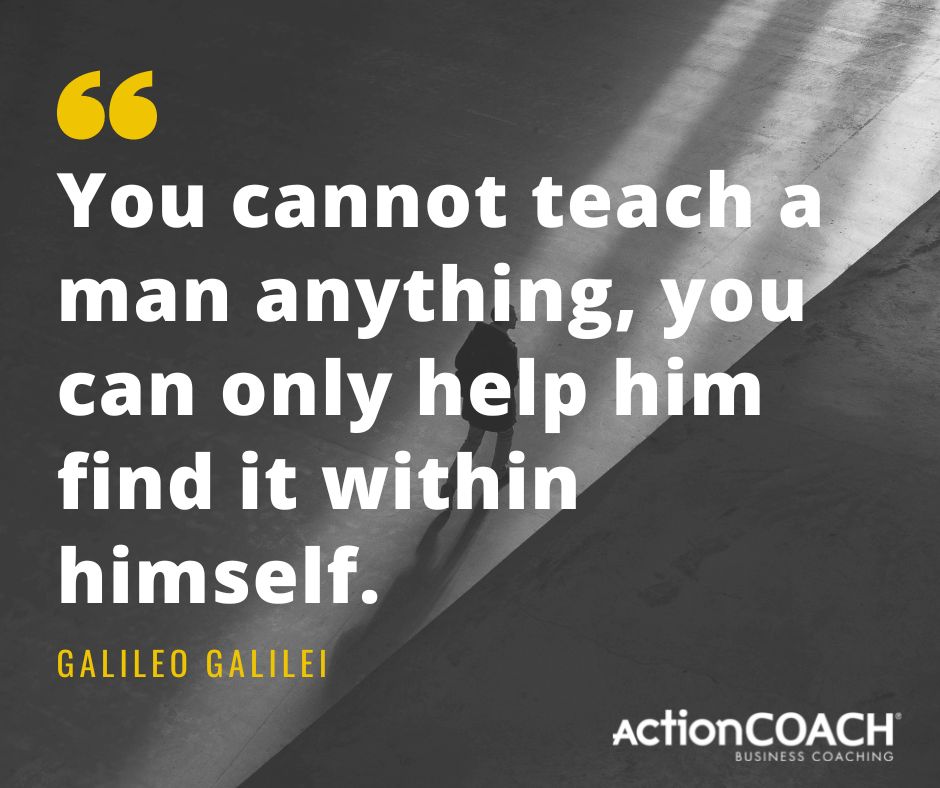“Everyone needs a coach. It doesn’t matter whether you’re a basketball player, a tennis player, a gymnast or a bridge player.” – Bill Gates
Now, obviously, as a business coach, I think every business owner can benefit from one of our coaching programmes, whether one-on-one or as part of a group coaching programme.
However, I also know that’s not always the case.
One thing I am certain of, though, is that a bit of good advice and support never hurt anyone.
Is business coaching for you?
I think that when people first start looking at coaching options, the word ‘coach’ springs to mind. We all know about coaches, right? Most sports teams and high-performing individuals have one. We understand what a coach does.
Or do we?
The broad term, coaching, can refer to many different support/training formats, and which one you choose will depend largely on your expected outcomes, where you are in your personal and professional journey and even personality.
So, I thought it might be handy to discuss some of the alternatives to business coaching because everyone deserves to receive the right support at the right time.
As a comparison starting point, here’s a quick explanation of business coaching as offered by Brian Tracy in The Ultimate Guide to Business Coaching :
“Business coaches are typically experienced entrepreneurs and business owners themselves who decide to use their talents for building and growing a business to help other business owners reach their goals.”
“…they work alongside executives and owners to help them define their goals, polish their vision for their business, and set in place a series of strategies that will help the owner achieve their goals and vision.”
5 coaching options that AREN’T business coaching
Consultant – A consultant usually has proven expertise in a specific area of business like logistics, HR or customer service. They work with clients to address an organisational challenge in that area through analysis and then presentation of solutions to solve that challenge on behalf of the client. One difference between a consultant and a business coach is a consultant provides and sometimes implements the answer, whereas a business coach encourages the client to explore possible solutions independently to reach the best answer for their business.
When to use a consultant – If your business has one particular challenge that needs resolving in the short term, and your focus is not overall business growth, a consultant may be the best solution.
Mentoring – mentoring happens when a seasoned executive guides a less seasoned person. It is a sharing of wisdom and insight with the mentee from someone who has ‘been there, done that’. Mentoring can be formal or informal and is typically slightly unequal with the person being mentored seen as junior to their advisor. The relationship can also be one of influence, opening doors for the mentee.
When to use a mentor – If you are keen to learn and progress your career through a relationship-based transfer of experience and skills while expanding your network, finding a mentor may be the option for you.

Training – training is more activity based and focussed on improving skills and behaviour through practice and repetition. It has specific goals and often takes the form of courses with structured outcomes. Training programmes can be off-the-shelf like the many online courses currently available or customised depending on client requirements.
When to use training – if you want to introduce your employees to a new skill, or improve on existing skills through a structured approach, then a reputable training programme will fit the bill.
Executive coaching – Executive coaching overlaps with business coaching to some degree, but it concentrates more on making leaders within larger organisations more effective to improve and sustain results. It helps executives to see situations differently and to be more flexible in how they drive results. It develops strategic thinking and overall leadership abilities to create high-performing executives.
When to use an executive coach – if you are an ambitious executive within a medium to large business looking for an objective sounding board and someone to help you unlock your potential and achieve objectives, then executive coaching makes sense.
Facilitator – Facilitators work with groups to help them reach clarity and resolution around a specific issue. These facilitation sessions can happen ad hoc, like at an executive brainstorming workshop or when there is conflict among senior leadership that needs to be resolved.
When to use a facilitator – if you are looking to encourage a group with diverse views and opinions to express those views in order to reach a decision, then the trusted environment a facilitator offers may be the most effective approach.
Business coaching is not for everyone, I agree. Just make sure that whichever route you choose, it’s the right fit for you. Otherwise, the programme will not be as effective as hoped, and the results will reflect this.
PS: To keep the list to 5 alternatives, I chose not to include the options that lean more towards personal development and support i.e. life coaching, relationship coaching or therapy. This was not to diminish their value but rather to keep the list more business related.
Martin Baillie is a Business Coach and Growth Specialist at ActionCOACH Bury St Edmunds, committed to working with business owners to create sustainable, viable, profitable entities within the local community.
We find that most business owners are experts in their industry but not in business. Our ActionCOACH business re-education coaching programmes help business owners to understand all aspects of business so they can build a profitable, sustainable business that works without them.
Contact Martin Baillie, ActionCOACH Bury St Edmunds now on Tel: 01284 334099. You can also follow him on LinkedIn, Instagram and Facebook.





